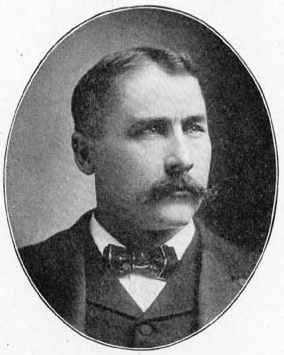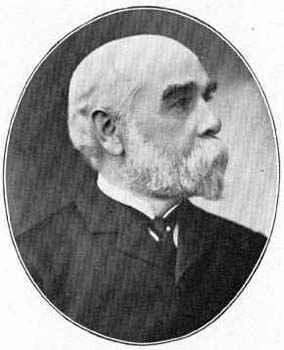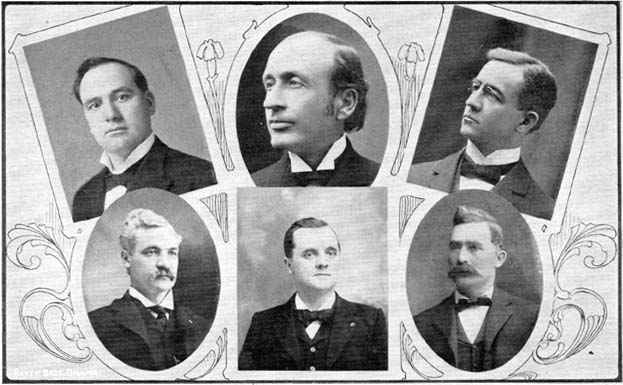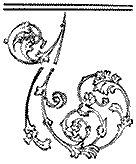
C. H. DIETRICH
NeGenWeb Project
Resource Center
On-Line Library

C. H. DIETRICH
Charles Henry Dietrich, United States Senator from Nebraska, is of German parentage, born in Aurora, Illinois, November 26, 1853. he received the rudiments of education in the public schools. At the age of twelve years he became a farm laborer, and when fifteen years of age went to St. Joseph, Missouri, and engaged as a clerk in a wholesale hardware store. He saved some money, and intended opening a hardware store in Arkansas, but was robbed of his funds, and for a few years was employed as the manager of a lumber camp. In 1876 he went to Deadwood, South Dakota, and opened a general store, and engaged in mining, being successful in both enterprises, in a few years selling his mining interests for a large sum. In 1878 he settled at Hastings, Nebraska, and engaged in the mercantile business. In 1887 he organized the German National Bank at Hastings, of which he is president. He was elected Governor of Nebraska in 1900, and on March 28, 1901, was elected to the United States senate to fill out the unexpired term of Senator Hayward, deceased. He resigned the governorship May 1, 1901, and took his seat in the United States Senate December 2, 1901. His term will expire March 5, 1905. Senator Dietrich is a widower and has a grown daughter.

J. H. MILLARD.
Joseph Hopkins Millard, U. S. Senator from Nebraska, was born in Hamilton, Canada, April, 1836, the son of natives of the United States temporarily residing abroad. In childhood he removed with his parents to Iowa, and resided at Sabula, Jackson county, where he received his early education in the public schools. At the age of eighteen years he entered a store at Dubuque as a clerk. Two years later he removed to Omaha, where he engaged in the real estate business, and later in banking. He became a director of the Omaha National Bank in July, 1866, and January 1, 1867, its president and cashier, and is still at the head of this institution, which is one of the staunchest banks of the West. For one term he was mayor of Omaha, and for six years a government director of the Union Pacific Railway Company, and subsequently a stockholder in the company and a member of the directory for seven years. He is a widower, and has a grown son and daughter. He was elected to the United States Senate March 28, 1901, succeeding Senator Thurston; took his seat December 2, 1901. His term will expire March 2, 1907. Senator Millard is a Republican.

|
|
|||||||||||
|
|
|
|
|||||||||
|
EDMUND H. HINSHAW |
|
J. J. McCARTHY. |
|||||||||
21
ELMER JACOB BURKETT.
Elmer Jacob Burkett, Member of Congress from the First District, was born in Mills County, Iowa, and is one of the younger members of Congress. He was born on a farm and his early life was very much the same as the life of the average farmer boy, with lots of hard work to develop physical strength, and the usual struggle in a common country school to gain the rudiments of an education. He was a diligent student and made the best of his time at school, and had the advantage of a course at Tabor College, at Sidney, Iowa, from which he was graduated in 1890. He then removed to Nebraska and became principal of a school at Leigh. After two years of teaching, he entered the law school of the University of Nebraska, and, in 1893, was given the degree of LL. B., and in 1895 that of LL. M. He was admitted to the Lancaster county bar in 1893, and has since been one of the foremost members.In 1897 he was a member of the lower house of the Legislature, representing Lancaster county. In 1898 he was elected to Congress, was reelected in 1900 and again in 1902, is each election receiving a handsome majority. No better evidence of his excellent service in Congress can be given than by his successive nomination and re-election. At the national capital he is looked upon as one of the brilliant ones among the younger members.
GILBERT M. HITCHCOCK.
Gilbert M. Hitchcock, the only Democratic Congressman from Nebraska now serving in the national house, was born in Nebraska forty-two years ago, and is a son of Phineas W. Hitchcock who was United States Senator from Nebraska from 1871 to 1877. Congressman Hitchcock acquired his early education is the Omaha public schools. Subsequently he spent two years in study in Germany, then entered the law school of the Michigan State University, from which he was graduated in law. For some years he practiced law in Omaha. In 1883 he founded the Omaha Evening World. In 1881 he acquired the Omaha Morning Herald, which he consolidated with his paper under the name of the World-Herald, which has since been published as a morning and evening paper. From 1894 to 1896 the World-Herald was edited by William Jennings Bryan. Congressman Hitchcock is still the owner and publisher of the World-Herald. In 1898 Mr. Hitchcock was nominated for Congress to represent the Second District of Nebraska and was defeated by Mercer by 1,100 votes. In 1902
he was again nominated for the same office and carried his district by 1,840 votes. Congressman Hitchcock is a son-in-law of Ex-governor Lorenzo Crounse who was Justice of the Nebraska Supreme Court, represented Nebraska in Congress, later served as Third Assistant Secretary of the Treasury and for one, term was Governor of Nebraska.
JOHN J. MCCARTHY.
John J. McCarthy, Congressman from the Third Nebraska District, is a native of Wisconsin, where he was born forty-six years ago. He is of Irish parentage, his father being one of the pioneers is Wisconsin. He was reared on a farm and received his early education in the common schools. When quite a young man he removed to Nebraska and commenced farming. At David City he began the study of law in the office of Horace Garfield, and in 1882 was admitted to the bar and soon after located at Ponca, in Dixon county, where he has since made his home. For three terms he was county attorney of Dixon county and served as a member of the lower house of this Nebraska Legislature during the twenty-sixth and twenty-seventh general sessions. Congressman McCarthy is a man of strong personality and during his membership in the Legislature was a recognized leader. As an attorney his reputation extends beyond the limits of Nebraska. He is generally recognized as a man of integrity, ability and high moral character and general worth. Mr. McCarthy was married in Butler county, Nebraska, to Miss Nellie B. McGowan, and has a family of seven children.
EDMUND H. HINSHAW.
Edmund H. Hinshaw, Member of Congress from the Fourth Nebraska District is a native of Indiana, being born in Henry county in 1860. His boyhood days were spent on the farm and in attendance at the public schools. It is evident that he was an apt student, as at the age of sixteen he commenced teaching is a country school, which he continued as a vocation during the winter months for a number of years, working on his father's farm during the summer time. By his teaching and his work as a farm hand, he earned sufficient money to pay his way through Butler University at Indianapolis, from which he was graduated in 1885. Immediately after his graduation he came to Nebraska and settled at Fairbury, his present home. He was elected superintendent of the Fairbury schools,
which position he held for one year, when he resigned to take up the study of law. He was soon admitted to the bar and then formed a partnership with Judge Letton, of Fairbury. In 1895 this partnership was dissolved because of Judge Letton's election to the bench. In 1899 Mr. Hinshaw was elected clerk and attorney for the City of Fairbury and by re-election filled both offices two terms. He also served one term as county attorney of Jefferson county. In 1898 he was the Republican candidate for Congress from his district and met with defeat. In 1902 his nomination for Congress was gained after a long struggle in convention at Beatrice, 845 ballots being taken before the nomination was made.
GEORGE W. NORRIS.
George W. Norris, Member of Congress from the Fifth Nebraska District, was born in Sandusky county, Ohio, in July, 1861. Left fatherless in his childhood, his youthful fight was a hard one. As soon as old enough to work, he became a farm hand, and during the summers, earned sufficient by his labors to enable him to attend school during the winter months. Thus he struggled along until he had equipped himself for school teaching. By teaching be earned sufficient money to pay his way through the Indiana Normal School at Valparaisa, and Baldwain at Berea, Ohio. While teaching school he devoted his spare moments to the study of law, and after leaving the University he spent one season in a lawyer's office, and then entered a law school. In 1883 he was admitted to practice. He had no money with which to open a law office and for two years continued as a school teacher, thus gaining sufficient money to purchase law books and open up an office. His first office he opened at McCook Nebraska, in 1885, where he followed his profession for ten years, when he was elected to the district bench. In 1899 he was re-elected and held the position when he was nominated by the Republican convention for Congress. He was elected by a good majority and promises to do his state highly creditable service in the national House of Representatives.
MOSES P. KINKAID.
Moses P. Kinkaid, Member of Congress from the Sixth Nebraska District, was born in Monongahela county, West Virginia, though his boyhood days were spent in Pennsylvania and Illinois. He received his early education in the common and private schools and entered the law school
of the University of Michigan at Ann Arbor, from which he was graduated in 1870. The town of O'Neill, in Nebraska, was founded along in the seventies and there Mr. Kinkaid located, and became one of the pioneers of that town, where he commenced the practice of law which he has carried an successfully ever since. In 1887 he was elected to the District bench and by re-election served in that capacity for thirteen successive years.During the legislative session in 1893 he was a member of the State Senate and was chairman of the Judiciary committee of that body. In 1890 Judge Kinkaid was one of the Republican candidates for a contingent position an the supreme bench of the state, but the constitutional amendment increasing the number of supreme judges failed to carry. In 1900 he was a candidate for Congress in the Sixth District but was defeated by the fusionists. He was again nominated in 1905 and was elected by a handsome majority. He has always been one of the staunch, unwavering Republicans of the state. Congressman Kinkaid is a bachelor.

25
 |
 |
 |
 |
 |
|
|
||||